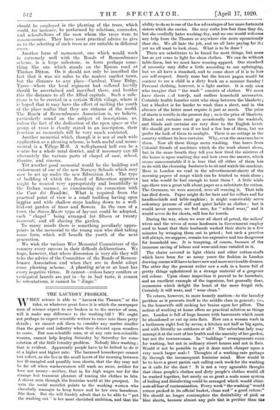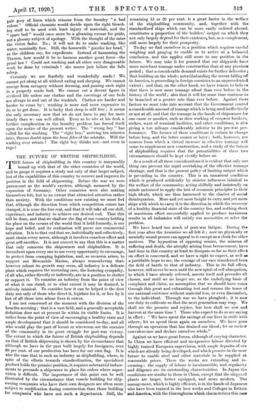THE LAUNDRY PROBLE1L
WHEN science is able to " harness the Thames," or the tides, or whatever great force it is which the newspaper men of science expect to see broken in to the service of man, will it make any difference to the washing-bill ? We ought not perhaps to expect scientific writers to enter into these petty details ; we cannot ask them to consider any matter smaller than the great coal industry when they descant upon wonders to come. But non-scientific man, or at any rate non-scientific woman, cannot help hoping Saturday by Saturday for some solution of the little laundry problem. Nobody likes washing ; that is evident•. Apparently people have to be bribed to do it at a higher and higher rate. The harassed housekeeper cannot but reflect, as she lies in the small hours of the morning between her ill-mangled and possibly torn sheets, that the day may not be far off when washerwomen will wash no more, neither for love nor money—neither, that is, for high wages nor for the strange but transient pleasure of tearing the clothes to bits. A shiver runs through the feminine world at the prospect. In vain the social moralist points to the working x oman who cheerfully manages to keep house and be her own laundress. She does. But she will frankly admit that to be able to " put the wishing out " is her most cherished ambition, and that the
ability to do so is one of the few advantages of her more fortunate sisters which she envies. She may make less fuss than they do, but she cordially hates washing-day, and no one would welcome any help from the Thames or anywhere else more uproariously than she. We all hate the job, and we all hate paying for it ; yet we all want to look clean. What is to be done ?
There are substitutes to be found for most things, but none has as yet come to light for clean clothes. We can do without table-linen, but we must have wearing apparel. Our standard of necessity may differ a little according to our upbringing, but we all have a standard, and to come short of it is to lose our self-respect. Surely none but the lowest pagan would be content to see a child in a dirty frock on a summer Sunday ! Personal clothing, however, is a light matter. It is only men who imagine that " the wash " consists of clothes. We must have sheets L.-id towels, and endless household necessaries. Certainly health fanatics exist who sleep between the blankets ; but a blanket is far harder to wash than a sheet, and in the absence of the latter must require it just as much. The price of sheets is terrific in the present day ; so is the price of blankets. Blinds and curtains must go occasionally into the washtub, and blinds and curtains are very dear to the English heart. We should get more sun if we had a few less of them, but we prefer the look of them to sunlight.. There is no cottage in the country without its lace curtains. Why, even the caravans have them. Now all these things mean washing. One hears from Colonial friends of machines which do the work almost alone, but in the same breath they tell you how tired the mistress of the house is upon washing-day and how cross the master, which seems unaccountable if it is true that all either of them has to do with the cleansing business is to sit and watch the machine. Here in London we read in the advertisement-sheets of the morning papers of soaps which can be trusted to wash alone ; but who would be fool enough to trust them ? A little while ago there was a great talk about paper as a substitute for cotton. The Germans, we were assured, were all wearing it. That talk has died down. Paper might do for hats and for collars and for handkerchiefs and table-napkins ; it might conceivably serve sedentary persons of stiff and quiet habits as clothes ; but it would never answer, we feel sure, for " school wear," and it would never do for sheets, still less for towels.
During the war, when we were all short of petrol, the sailors' wives and the wives of some landsmen in Government employ used to boast that their husbands washed their shirts in a few minutes by wringing them out in petrol ; but sach a practice will always, we suppose, remain too expensive and too dangerous for household use. It is tempting, of course, because of the immense saving of labour and wear-and-tear entailed in it.
The chairs covered in light chintz and other cotton-stuffs which have been for so many years the fashion in London drawing-rooms will have to have new and more serviceable dresses. The other day the present writer saw a sofa in a house full of pretty things upholstered in a strange material of a gorgeous red colour. Upon closer inspection it proved to be horsehair, and an excellent example of the ingenious, but generally dear, economies which delight the heart of the more frugal rich. Certainly it will wear, and " wear clean."
To return, however, to more homely matters—to the laundry problem as it presents itself to the middle class in general; i.e., to the housewife still racking her brains upon her pillow. The notion of washing at home offers no practical solution as things are. London is full of huge houses with basements which must be abandoned or cut up into flats. How can a woman wash in a bathroom eight feet by seven, a kitchen not half as big again, and with literally no outdoors at all ? The suburban lady may manage it at the cost of her health and the amenity of her garden, but not the townswoman. In " buildings " arrangements exist for washing, but not in ordinary street houses and not in flats. Would it not be possible to get it done much cheaper upon a very much larger scale ? Thoughts of a washing-rate perhaps fly through the inconsequent feminine mind. How would it be to have a great parish cart calling each week for the washing as it calls for the dust ? It is not a very agreeable thought that clean people's clothes and dirty people's clothes would all be washed together, but surely on so great a scale some system of boiling and disinfecting could be arranged which would elimi- nate all fear of contamination. Every week " the washing " would return packed in its official basket, clean and " a good colour." We should no longer contemplate the desirability of pink or blue sheets, because almost any pale tint is prettier than the pale grey of linen which returns from the laundry " a bad colour." Official chemists would decide upon the right bleach- ing stuff to be used with least injury of materials, and the a spare bed " would once more be a gleaming excuse for pride, not a gloomy subject of apology. With the thought of the rates the vision fades. No ; it will not do to make washing, like water, nominally free. Still, the housewife " puzzles her head," as the children say, for expedients. Instead of harnessing the Thames, how would it be to harness another great force—the penal law ? Could not washing and all other very disagreeable work be done by criminals ? she muses just before she falls asleep.
Certainly we are fearfully and wonderfully made ! We cannot get along at all without eating and sleeping. We cannot emerge from savagery without dressing, and passing each night in a properly made bed. We cannot cut a decent figure in civilized life unless our clothes and the coverings of our beds are always in and out of the washtub. Clothes are harder and harder to come by ; washing is more and more expensive to do or to get done. It is lucky that sleep is still free ; it seems the only necessary now that we do not have to pay for more dearly than 11,3 can well afford. Even as he sits at his desk a further complication in the laundry problem has forced itself upon the notice of the present writer. The " wrong boy " has called for the washing. The " right boy," arriving ten minutes later, throws doubt upon the bona fides of the mistake. Will the washing ever return ? The right boy thinks not—not even in rags !



































 Previous page
Previous page